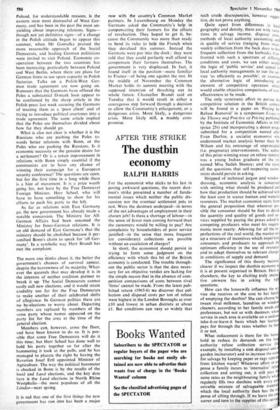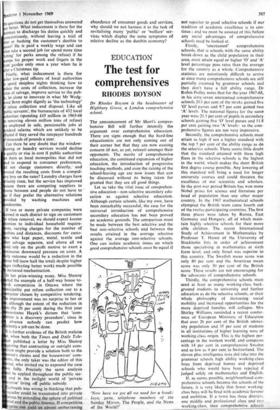AFTER THE STRIKE
The dustbin economy
RALPH HARRIS
For the economist who sticks to his last in posing awkward questions, the recent dust- men's strike presented a number of funda- mental issues which neither the public dis- cussion nor the eventual settlement puts to rest. Were the dustmen underpaid—in terms of the net advantages of employment in their chosen job? Is there a shortage of labour—in the sense of fewer men coming forward than the customers would be willing to pay? Are complaints by householders of poor service justified—in the sense that more frequent (or considerate) collections are possible without an escalation of charges?
In short, the economist should persist in trying to form some judgment on the efficiency with which this bit of the British economy is conducted. The trouble through- out the public sector is that the data neces- sary for an objective verdict are lacking for the simple reason that in the absence of com- petition comparisons of costs between rival 'firms' cannot be made. From the latest pub- lished return (1965-6) we discover that col- lection and disposal costs per ton of refuse were highest in the London Boroughs at over £10 and lowest in urban districts at about f I. But conditions can vary so widely that
such crude discrepancies, however sugges tive, do not prove anything.
Quite apart from differences in loca geography and density, there are wide varia tions in salvage income, disposal costs methods of local authority accounting, an in quality of service (ranging from twice weekly collection from the back door to lee frequent collection from the kerbside). Con fronted with such a spectrum of differini conditions and costs, we can either accep the logic of 'public service' and appeal te local authority managements to run the ser vice 'as efficiently as possible', or examin( the alternative logic of introducing at element of competitive operation whicli would enable objective comparisons of cost. effectiveness to be made.
The only systematic effort to pursue the competitive solution in the British context will be found in a paper on 'Pricing for Refuse Removal' in a symposium Essays- in the Theory and Practice of Pricing published by the Institute of Economic Affairs in 1967 (price 25s) and incorporating a dozen essays submitted for a competition named after Evan Durbin, a socialist economist who understood market analysis better than Mr Wilson and his entourage of unprincipled (i.e. pragmatic) interventionists. The author of this prize-winning essay on refuse removal was a young Indian graduate of the LSE named Miss Sudah Shenoy; and she raises all the questions that self-respecting econo. mists should persist in asking.
Stripped of technical jargon and window- dressing, economic analysis is concerned with settling what should be produced and how that production Should be achieved with the least cost in scarce human and material resources. The market economist starts from the general proposition that wherever pm. sible the consumer should be free to decide the quantity and quality of goods and ser- vices supplied by paying the prices asked by competing producers who meet his require- ments most nearly. Allowing for all the im- perfections of the real world, the market sets up a structure of incentives which impel both consumers and producers to approach the optimum efficiency in the use of resources and to adapt themselves to relevant changes in conditions of supply and demand. The significance of this theory becomes clearer if we 'inspect the dustbin economy as it is at present organised in Britain. Here as elsewhere, the key to eliciting truly instrue tive answers lies in asking the ri questions.
How can the housewife influence the se1. vice she receives or the cost to her fami of emptying the dustbin? She can choose tween rival milkmen, laundries or window cleaners, according to her family needs a preferences, but not so with dustmen, wh service in each area is available on a undo take-it-or-leave-it basis which her husban pays for through the rates whether he lik it or not.
What inducement is there for the ho hold to reduce its demands on the I authority refuse collection service (f example, by installing a sink disposal unit garden incinerator) and to increase the sco for salvage by keeping paper or rags separa from kitchen waste? Whatever effort or e pense a family incurs to `internalise' ref collection and sorting out, it still pays same rates as the neighbouring family wh regularly fills two dustbins with every ceivable mixture of salvageable motet which the local authority then has the pense of sifting through. If we leave the sumer and turn to the supplier of this sere questions do not get themselves answered y better. What inducement is there for the tistman to discharge his duties quickly and onscientiously, without leaving a trail of 'Or or bashing the customer's dustbin to 'eces? He is paid a weekly wage and can ften take a second job (or spend more time ming' for perks among the refuse) if he ps his proper work and lingers in the ont garden only once a year when he is tier a Christmas tip.
Finally, what inducement is there for tiler low-paid officers of local authorities spend sleepless nights thinking how to ce the costs of collection, increase the alue of salvage, improve service to the pub- , let alone to innovate in what Mr Wedg- ood Bean might dignify as 'the technology' refuse collection and disposal. Like all • blic servants', the bureaucrats of 432 local thorities (spending £45 million in 1965-66 removing eleven million tons of refuse) e employed in safe, pensionable jobs at • ndard salaries which are unlikely to be • ected if they saved the ratepayer hundreds thousands of pounds a year.
Can there be any doubt that the window- caning or laundry services would decline • quality or rise in cost if public authorities n them as local monopolies that did not ed to respond to consumer preferences, d not charge customers directly, and • vered the resulting costs from a compul- • ry levy on the rates? Laundry charges have rtainly risen, but the service has improved cause there are competing suppliers to oose between and people do not have to - y if they prefer the alternative solutions ovided by washing machines and nderettes.
If two or more private companies were ensed in each district to sign on customers r refuse removal, we should expect keener ntion to individual household require- nts, varying charges for the number of stbins and distances, discounts for custo- rs who kept paper, metal, textile and er salvage separate, and above all we uld rely on the profit motive to exert a inuous downward pressure on costs. A ely outcome would be a reduction in the our bill (now half the total) despite higher ges (reflecting better work) made possible increased mechanisation.
her prize-winning essay, Miss Shenoy ted the example of a half-way house to- rds competition in Ottawa where the nicipality put refuse collection out to a tractor chosen by competitive tendering. improvement was no surprise to her or • although the extent of the reduction in ts (by 20 per cent) during the first year onstrates Hayek's dictum that 'corn- lion is a discovery procedure', since in absence nobody can predict how ently a job can be done.
t is further evidence of the British malaise t, when both the Times and Daily Tek- Ph published a letter by Miss Shenoy • gesting that contracting or outright com- tion might provide a solution both to the men's claims and the housewives' corn- lilts, the only taker was the editor of this mai, who invited me to expound the case re fully. Precisely the same analysis Id be applied throughout the public sec- and in the twilight world of `private rprise' living off public subsidy.
• albraith was wrong in thinking that pub- ualor could be transmuted into private nee by extending the sphere of political rol and the public finance. If competitive rPrise can yield an almost embarrassing abundance of consumer goods and services, why should we not harness it to the task of revitalising many 'public' or 'welfare' ser- vices which display the same symptoms of relative decline as the dustbin economy?















































 Previous page
Previous page